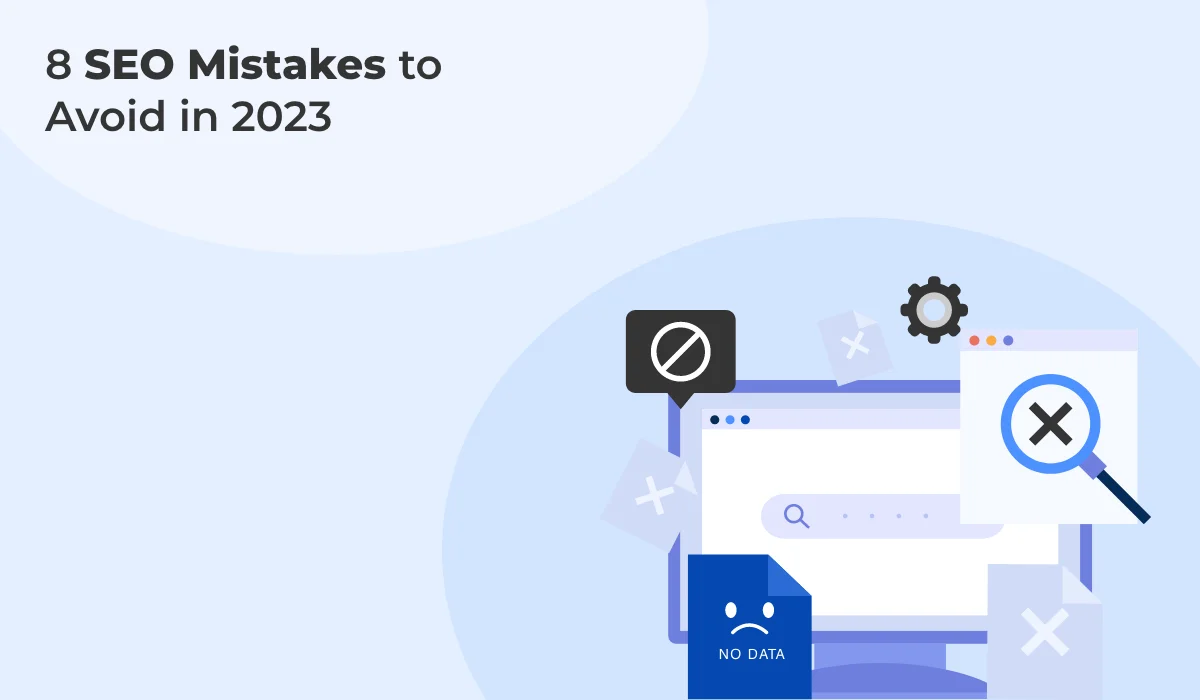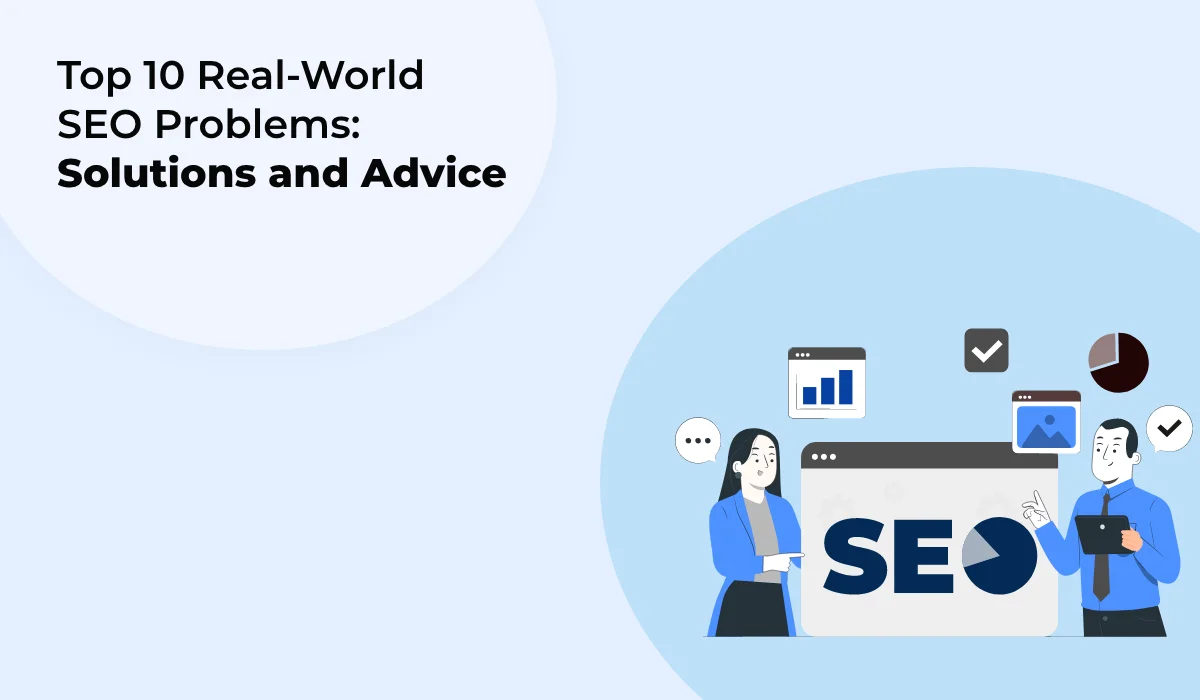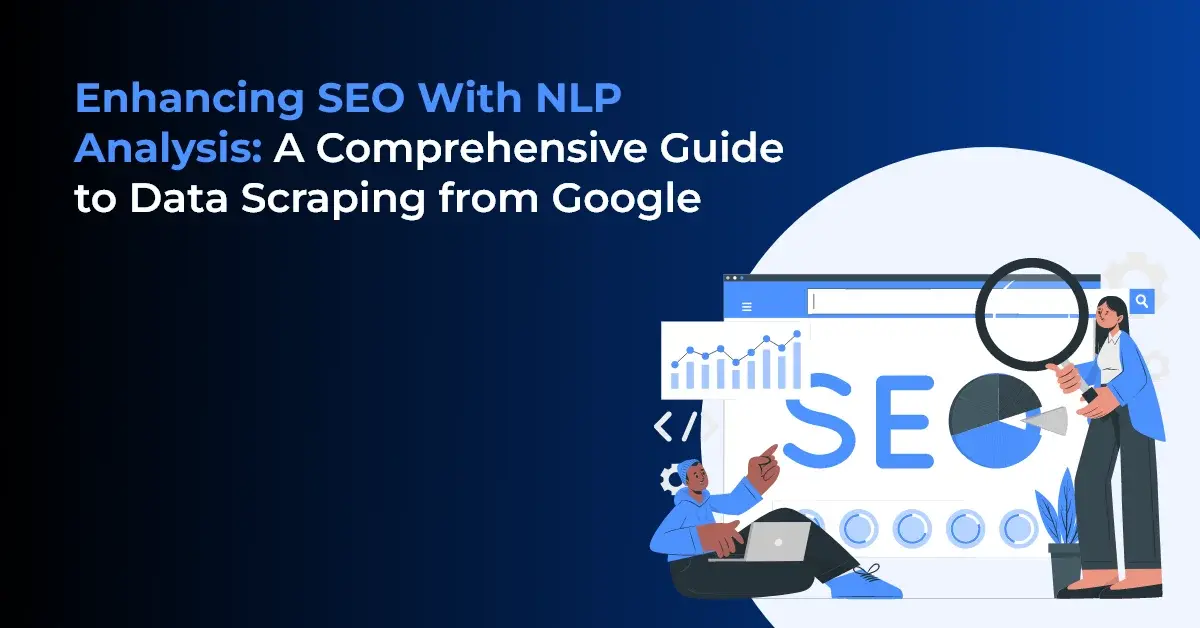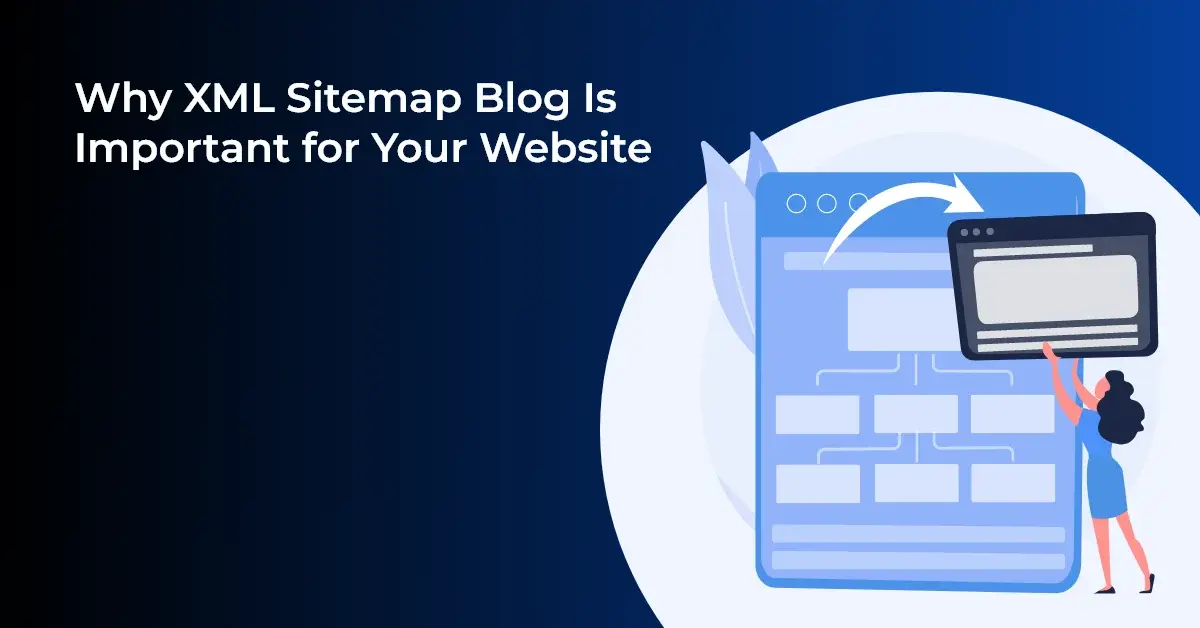SEO Mistakes to Avoid

Published on: October 15, 2021
Updated on: May 13, 2024
580 Views
- SEO (Search Engine Optimization)
19 min read
Hello there, savvy webmasters and digital marketers! As we sail, it's time to leave outdated SEO tactics in our wake and chart a course for success. Google's algorithms are more sophisticated than ever, and keeping up with their guidelines isn't just a best practice—it's the bedrock of your website's health and search rankings. In this guide, we'll navigate the treacherous waters of SEO mistakes you'll need to avoid to ensure your online presence stays buoyant.
Are you still clinging to SEO approaches that have gone the way of the dodo? Keyword stuffing, neglecting mobile optimization, ignoring local SEO, buying links—these are just a few of the outdated tactics that could see your search presence walk the plank. Let's dive into how you can avoid these pitfalls and keep your business's digital strategy in shipshape!
“A smart man makes a mistake, learns from it, and never makes that mistake again. But a wise man finds a smart man and learns from him how to avoid the mistake altogether.” - Roy H. Williams
Have you ever created a website following the latest SEO algorithms? Took you hours and even days of planning and research? Only to find the scarcity of organic traffic and a lack of reach?
Are the overall statistics of the website not showing any staggering increase in clicks or any significant improvement in the page rankings?
Well, you are not alone. Many business owners and marketers fail to get the desired results. This is often because they fall prey to common SEO mistakes.
Google changes its search algorithm very frequently. Thus, it is important that SEO experts adapt to these algorithms and stay updated with the trends for a satisfactory outcome.
SEO Mistakes to Steer Clear From
With wrong information, marketers often spend a huge deal of effort and time on wasteful strategies. Here are some of the most common SEO mistakes that may slide by your eye and impact your website negatively.
Keyword-Stuffed Content
Keyword stuffing is one of the biggest errors you can make in your SEO strategy. All forms of keyword stuffing are widely unacceptable and can lead to serious penalties. In simple words, filling your webpage with unnecessary keywords won't rank higher on Google SERPs.
If the keyword satisfies the user search content, the overuse of the same keywords can cost the website a search penalty. Your website may even be removed from the Google search results altogether.
The technologies powering the search engines today have been optimized to detect keyword stuffing hence it is unwise to continue that practice.
In the current technological landscape, search engines are equipped with advanced algorithms that prioritize user experience and the delivery of relevant, valuable content. Instead of relying on keyword stuffing, it is more effective to focus on providing comprehensive and informative content that addresses the needs and queries of your target audience.
Furthermore, as search engine technologies continue to evolve, keyword stuffing will become even more detectable and ineffective. Search engines are constantly improving their ability to understand the context and meaning behind search queries, allowing them to deliver more accurate and relevant results to users. Consequently, keyword stuffing will not only fail to improve your search rankings but may also have a detrimental impact on your website's visibility and credibility.
Poor Website Performance
User experience is greatly affected by low-performance websites and hence the efficiency and speed are some of the biggest causes of declining engagement of website traffic.
Page load times are increasingly becoming an essential part of converting traffic into an engagement. The slower your website is, the more it tests the users’ patience. Users having a busy lifestyle would immediately move on to the next website if your website doesn't load in time.
To prevent this, you should build the rendering speed of the web page to be in optimal conditions, even uncached javascript might be the core of the slow speed load times
Leaving the practicality of slow load speeds, Google also analyzes site speeds and can hurt your site ranking. Google can prioritize your website amongst higher site rankings if your website showcases good loading speeds.
Black Hat Methods
In the SEO and marketing sector terms like the White hat, Grey hat, and Black hat are used often. White hat methods are encouraged by search engines, Grey hat practices are low-key exploits that might be acceptable for the time being but have a high probability of being blacklisted shortly.
Black hat methods however are unethical practices used to overcome the search engine system. These methods exploit the search engine algorithms to boost the site ranking within a shorter time window. This undoubtedly is one of the top SEO mistakes made in accordance to the risk it possesses.
Methods such as backlink buying are one of the few backhanded practices that are dangerous for your website. Since Google terms this as a severe manipulation of the site ranking system, do not be surprised if you face major penalties upon being caught for these practices.
Even if the website hasn’t been penalized it is only a matter of time when it happens. Google is well within its legality of penalizing websites, even if websites have used black hat methods years ago. Hence, make sure to go back to your website records and verify that no artificial methods of search engine exploitation are being used currently.
Lack of Mobile-Responsive Websites
In the present era, having a mobile-responsive website has become an essential requirement for running a successful online presence. With approximately half of all web traffic originating from mobile devices, the significance of ensuring a website's mobile compatibility is indisputable. Consequently, there is no room for debate when it comes to the necessity of a website being mobile responsive.
However, a great number of websites have failed to see the importance of mobile-friendly websites and thus end up with reduced traffic. If the website is mobile-responsive the text and images will automatically resize in the correct ratios depending on the device to give a good experience to the users.
Without mobile responsive facilities, the elements could be in a poor ratio that might render them to be illegible and cause the mobile traffic to leave the website without resulting in any engagements.
Without mobile responsiveness, the elements on a website can appear distorted and disproportionate, making them difficult to read or navigate. This can lead to frustration and a poor user experience, causing mobile traffic to quickly exit the website without engaging or taking any desired actions. In an era where user experience is a critical factor in online success, neglecting mobile responsiveness can severely impact a website's performance and overall engagement metrics.
In the ever-evolving digital landscape, mobile usage continues to rise, making it imperative for businesses to prioritize mobile responsiveness in their website design and development strategies. By ensuring that your website is optimized for mobile devices, you can capture the attention and engagement of a significant portion of your target audience. This, in turn, can lead to increased conversions, improved user satisfaction, and better overall business outcomes.
Irrelevant Meta Tags
Place only the meta tags that match the description of the content. Google edits the title tag and meta description if the website doesn't showcase the content mentioned in the title tag.
This can replace the important tags for your specific audience with random tags. This countermeasure was implemented to fight against the websites which use clickbait tags to rope in viewers only to waste their time, the traffic will leave immediately upon seeing the content displayed is not what they searched for.
For reducing this saturation and giving a better overall search engine experience Google will reduce the rankings of clickbait tags using websites, hence make use of title tags and meta tags that are related to the content being displayed.
Ignoring the Importance of Analytics
Search engine optimization practices are not entirely meant for the control of organic traffic towards your website. The major criteria that count is the conversion rate of the clicks into sales. Without the conversion, the number of clicks will remain a mere statistic that might be good to showcase but will become obsolete if the overall sales aren't improving.
The effectiveness of your SEO campaign can be understood after analyzing the numbers and statistics. You cannot take major decisions without understanding these digits. SEO cannot be treated as a one-time operation, it is an end product of constant modification and adapting to the ever-changing algorithm and its trends.
Duplicate Content
The search engine algorithms do not support duplicate or the same “word-to-word” content. It will be automatically termed as a low-quality user experience and the websites found to be displaying unoriginal content will be subjected to suitable penalties. Original content will go a long way in increasing the site rankings.
A content piece or blog displayed on multiple websites will not do well and will fall under content saturation. This will be marked as a poor search experience by Google. If the website is not able to provide original and high-quality content, hiring a professional copywriter could help you improve the quality of the web page and possibly increase the site rankings.
Related: 5 Best Free SEO Tools You Need To Rank high on Google
Search Intent
While staying within the rules of search engine algorithms and increasing the efficiency of the website is the target goal, the audience should also be focused on search intent. It is a hidden ranking factor that many websites have failed to focus on.
A website with the top of the line performance and the best SEO tactics can still fail. They may only provide content that is only relevant to Google and not to the satisfaction of the target audience. A healthy balance of technical details and non-technical details is important.
Providing the right information the user seeks would require knowing the motive of the audience upon searching the query on Google. Failure to satisfy the search intent of the website traffic can affect the website rankings deeply.
Mobile-First Is Here to Stay: Ignoring Mobile Optimization
In today's digital landscape, where the majority of internet users are reaching for their smartphones to browse, shop, and interact online, mobile optimization isn't just a trend; it's a staple. With mobile-first indexing now deeply entrenched in search engine algorithms, the message is crystal clear: if your website isn't optimized for mobile devices, you're already behind.
The Significance of Mobile-First Indexing for Search Engines
Search engines prioritize mobile-friendly sites when presenting search results. This means that sites optimized for mobile have a better chance of ranking higher, which is essential for your online visibility and traffic. Understanding that search engines treat the mobile version of your site as the primary version is critical to your SEO strategy.
Tips on Ensuring Your Website Is Optimized for Mobile Devices
- Responsive Design: Ensure your website adapts seamlessly to the screen sizes of various devices.
- Touchscreen Readiness: Make sure all buttons and navigational elements are easy to use on touchscreen devices.
- Fast Loading Speeds: Mobile users expect quick access to information, so site speed is vital.
- Accessible Content: Content should be readable without zooming or horizontal scrolling.
- Test Your Site: Use mobile usability testing tools provided by search engines to know where you stand and what needs improvement.
Embracing a mobile-first approach is essential not just for SEO but also for providing a positive user experience. Staying attuned to mobile optimization needs will set your site up for success in a world that's always on the go.
Building a Solid On-Page SEO Framework
As we march forward, understanding the bedrock of on-page SEO is more crucial than ever. While it’s easy to get caught up in the latest trends and algorithm updates, some fundamentals should never be neglected. These core elements are pivotal in conveying to Google exactly what your content is about and how it should rank in search results. Let’s break down the key on-page SEO components that are often overlooked yet essential for your digital success.
On-Page SEO Elements: The Often-Forgotten Heroes
On-page SEO is not just about sprinkling keywords into your content; it's about a strategic approach to ensure that every element of your webpage is contributing to your overall SEO goals. From title tags to meta descriptions, each aspect plays a part in the search engines' complex process of understanding and ranking your page. These on-page factors are your direct line of communication with search engines, telling them how to categorize and value your content in the vast ocean of information that is the internet.
- Title Tags: Your first handshake with search engines, crucial for relevance.
- Meta Descriptions: They may not directly affect rankings, but they're essential for click-through rates.
- Header Tags: Hierarchy matters. Use H1, H2s, and H3s to structure your content effectively.
- Image Alt Text: It’s not just for show; alt text helps search engines interpret the visuals on your page.
- Internal Linking: Connect the dots within your website to keep users engaged and to spread link equity.
By meticulously honing these elements, you're not only improving your website's readability and user engagement but also signaling to Google the relevacy and structure of your content. In world where every little bit of SEO leverage counts, paying attention to these on-page factors isn't just recommended; it's necessary for staying competitive. So, as you refine your SEO strategy, remember that the foundation of on-page SEO is not a once-and-done task - it's an ongoing commitment to excellence and precision that will serve you well in the ever-evolving digital landscape.
Proving Your Worth: E-A-T in SEO
Let's have a heart-to-heart about something crucial in the SEO world—E-A-T. And no, it's not about lunch. We're talking about Expertise, Authoritativeness, and Trustworthiness. Google's not just looking for quality content; they want content that echoes with credibility. Why? Because, in the sprawling chaos of the internet, Google aims to direct users to information that's not just relevant, but also reliable and written by genuine experts.
Expertise: Show What You Know
When it comes to Expertise, think about creating content that showcases your in-depth knowledge. Share insights, offer detailed solutions, and don't shy away from niche topics where you can truly shine. Whether you're a seasoned chef dishing out intricate recipes, or a tech wizard demystifying blockchain, your content should display your mastery of the subject.
Authoritativeness: Be the Go-To Source
Authoritativeness takes expertise a step further. It's all about becoming the go-to source in your field. You gain authority by earning recognition from your peers, collecting quality backlinks, and getting your brand mentioned by leading figures and publications. Think of it as the SEO world's version of vouching for your street cred.
Trustworthiness: Building Confidence in Your Content
As for Trustworthiness, it's the glue that holds everything together. If your website screams, "I'm a secure and credible platform," people—and search engines—will take note. Acquiring SSL certificates, having transparent author bios, and citing reputable sources are all steps towards sealing this trust pact with your users.
Tailoring E-A-T for Your Industry
Now, you're probably wondering how to implement these abstract concepts for your specific industry. Start by:
- Highlighting your qualifications and experience prominently on your site.
- Encouraging customer reviews and testimonials, as they foster credibility and showcase satisfaction.
- Engaging with your community through webinars, social media, or public speaking engagements to build authority.
- Maintaining an up-to-date blog with informative content that answers your audience's burning questions.
So, remember that E-A-T is more than just three letters; it's your ticket to proving your worth in the SEO game. Cater to these qualities, and watch your website not just grow—but flourish.
The Backlink Building Blocks
While the landscape of SEO is ever-evolving, the importance of backlinks remains a cornerstone of a strong digital presence. Search engines continue to value high-quality backlinks as vital indicators of a website's credibility and authority. But not just any backlink will do; it's the quality and relevance that truly matter.
Why Backlinks Maintain Their SEO Reign
In the realm of SEO, backlinks are akin to digital endorsements. Each quality link pointing to your site serves as a vote of confidence in the eyes of search engines. But as algorithms grow more sophisticated, they can now distinguish between a genuine endorsement and a hollow gesture. Thus, it’s not just about accumulating links—it's about earning the right ones.
Ethical Backlink Strategies that Pay Off
As we focus on ethical strategies to build this digital trust, let's consider:
- Guest posting: Contribute valuable content to reputable sites in your industry and include a link back to your own domain.
- Creating shareable content: By crafting informative, compelling, and engaging content, you naturally encourage other sites to link back to your resources.
- Engaging with online communities: Participate in forums, discussions, and social media groups relevant to your sector. This increases your visibility and the potential to earn authoritative backlinks.
- Strategic partnerships: Collaborate with complementary businesses or influencers that can introduce your brand to wider audiences and generate organic backlinks.
Beware, the path to backlink nirvana is fraught with temptations to take shortcuts. Buying links or participating in link exchange schemes may yield immediate gratification but beware the long-term ramifications. Such spammy tactics are a red flag to search engines, and the penalties can be severe, undermining your SEO efforts.
Remember, building backlinks is not a one-off campaign; it's an integral component of your ongoing digital strategy. By consistently applying ethical practices, you cultivate a sustainable backlink profile that can withstand the ebb and flow of search engine tides. Make this year you solidify your reputation with the building blocks of backlink success.
Structuring Success: The Role of Schema Markup
Have you ever wondered how some search results pop out with star ratings, event times, or even a handy recipe, right in the search pages? That's schema markup working its SEO magic! Understanding the impact of schema markup and structured data on search visibility is more crucial than ever. It's not just about being found; it's about standing out.
The Impact of Schema Markup on Search Visibility
Schema markup is a powerful SEO tool that communicates the content of your webpage to search engines in a language they understand—structured data. By tagging different elements on your page according to data schemas, you enable search engines to display rich snippets, enhancing visibility and click-through rates. It's like giving Google a map to your content's highlights—ensuring they're easy to find and appealing to explore.
A Guide to Implementing Technical Enhancements on Your Content
Rolled your sleeves up and ready to dive into schema? Here's a quick guide:
- Identify the type of content you want to mark up whether it's articles, events, products, reviews, etc.
- Visit Schema.org to find the appropriate markup for your content type.
- Use a structured data testing tool to ensure the markup works correctly.
- Implement the markup on your site. You can manually add it to the HTML or use a plugin or CMS feature, depending on your platform.
- After deployment, monitor the performance and appearance in search results, using tools like Google Search Console.
While it might seem technical, implementing these enhancements is a step that can significantly influence your content's performance. Not only does it aid in indexing, but it can also improve the way your content communicates with both search engines and potential visitors. Don't let your SEO strategy fall flat because you've neglected the vital step of structured data—embrace schema and Anchor Text Strategy: Avoiding Missteps
In today's ever-evolving SEO landscape, understanding the nuances of anchor text strategy is essential for site rankings and credibility. Having witnessed the dynamics of SEO tactics for the past years, one cannot overstress the decisive role that anchor text plays in link building and search performance.
The Impact of Anchor Text on Link Quality and Search Rankings
The right anchor text can bolster your link profile by conveying clear, relevant signals to search engines about the content it points to. This in turn can elevate your search rankings, making your website more discoverable. Conversely, poor anchor text selections can lead search engines to question the quality of your links, potentially diminishing their positive effects or, worse, triggering penalties.
How to Use Anchor Text Effectively Without Falling into Spammy Practices
In the quest to optimize your site, it's tempting to over-engineer anchor text to the point where it feels unnatural or manipulative. To ensure you're using anchor text to your best advantage, consider these guidelines:
- Maintain a natural mix: Diversify your anchor text to include branded, generic, exact match, and long-tail keywords. It should mirror the organic language users might employ to refer to your content.
- Context is key: Anchor text must be relevant to the page it's linking to. Irrelevant text could confuse users and search engines, which could be detrimental to user experience and SEO performance.
- Avoid over-optimization: Using the same exact match keyword text across numerous backlinks can appear forceful and spammy. Strive for subtlety and variety in your anchor text profiles.
- Keep it concise: Long-winded anchor texts can disrupt the user experience and may diminish the perceived relevance of the link. Aim for succinct, descriptive anchors.
While anchor texts may seem like a small component of your SEO strategy, their influence on your site's search performance is significant. As we look ahead, stay ahead of the game by refining your anchor text approach to avoid these common SEO missteps that could otherwise compromise your hard work. Watch your content become more visible than ever.
Conclusion
The successes of SEO strategies focused on driving traffic will be dependent on search engines down the road. To nail your SEO strategy you should take note of the above-mentioned common mistakes. Also, it is a great idea to run an SEO audit every six months to find and fix problems on your website.
If you need any help with it, we are here! Growth Natives’ digital team keeps up with the latest trends and believes in satisfying the search engine algorithms. We can help you avoid mistakes that Google can penalize you for and save your website from losing traffic. Let’s talk! Alternatively, feel free to write to us at info@growthnatives.com and we’ll get back to you.



